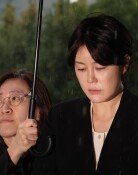Imperial parliament in Korea?
Son Byung-suk, director of Railway Bureau at the Land, Infrastructure and Transport Ministry, has met some 100 National Assembly members of both main and opposition parties in the past month. He took countless photos with these people wearing "gold badges" for legislative report purposes. The reason he became popular is because of the third national railway construction plan that the government has to draft. In other words, this is to show off to his regional district that "I`m striving hard."
The allocated budget for this national project is 30 trillion won (27.47 billion U.S. dollars), but the lawmakers` combined budget demand tops 120 trillion won (93.45 billion dollars). After lots of thought, the government is considering announcing the national railway construction plan after the general elections in April next year. This is a desperate attempt as dealing with "super power" National Assembly members was going beyond its capacity.
Legislative power often leads to the collapse of the separation of powers among the three branches of government. Enactment of enforcement ordinance has to be at the government`s sole discretion. Yet criticism is rising that the National Assembly is deeply intervening in the enactment of enforcement ordinance of special law related to the sinking of Sewol ferry on reasons for the need of fact finding. A government official said, "Lawmakers are threatening to promote enforcement ordinance to legislation if we don`t do as told."
With the approval of Supreme Court justice candidate Park Sang-ok limping along, the justice post has remained vacant for more than 100 days. A member of the National Assembly`s Security and Public Administration Committee appeared at one police patrol division while drunk to lead the investigation of raincoat men, or exhibitionists. The rough words of opposition party leaders are hard to listen to. All these show the prevailing abuse of legislative authority.
The National Assembly Advancement Law, which clings to just reaching agreement between main and opposition parties while defying the majority rule of the representative democracy, has made collision between the parties a common thing. Main opposition New Politics Alliance for Democracy said on Wednesday that if the 50 percent income replacement ratio of the national pension is not reflected in parliament rules, urgent public welfare bills including the income tax bill revision for year-end tax deduction can`t be treated. Many criticize that this is a legislative tyranny using National Assembly Advancement Law as an excuse. No wonder people say that "imperial parliament," not imperial president is the problem.
The Dong-A Ilbo on Monday released an extensive story on the abuse of "imperial" legislative power and its structural reasons. Experts say an environment should be formed where the legislative power can self-purify. Strict verification is done for prime minister or government minster candidates, and indulgence can`t be granted on lawmakers just because they are elected officials. Many analysis materials also show that at least a minimum verification should be done on their qualifications starting from screen nominations.
"Discussion should start on making a system where verification of parliament members can be done," Myongji University Professor Shin Yul said. "Civic groups and voters should also do away from siding specific parties and play the judgment role through supervision of authority and voting."
beh@donga.com
Headline News
- N. Korea redefines S. Korea as ‘hostile state’ in revised constitution
- Samsung develops graphic DRAM with industry-leading capacity and speed
- Three questions allegedly leaked via text message during Yonsei Univ. essay test
- China to inject 340 trillion won in loans to support real estate sector
- Dodgers beat Mets to take 2-1 lead in NLCS







